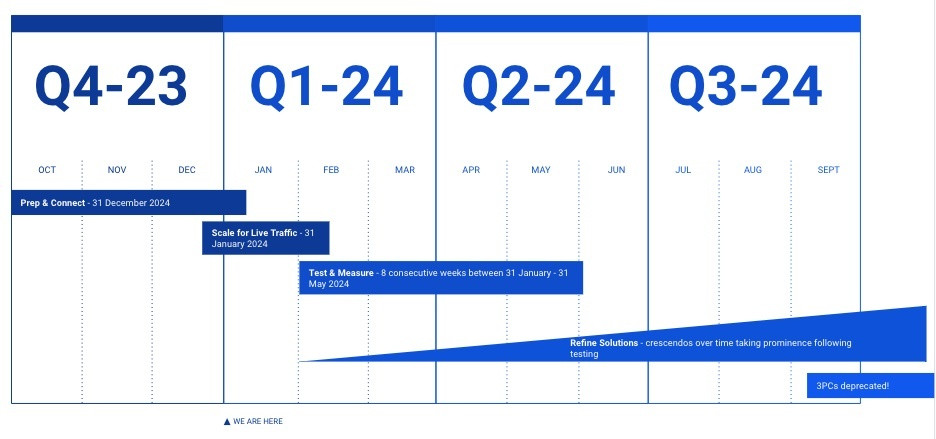Since the advent of programmatic advertising, the cookie has been the core ID used to target internet users, serve them ads, and track the impact of that advertising. Since Apple started removing cookies with the first iteration of its Intelligent Tracking Prevention (ITP) in 2017, we have seen other web browsers follow suit. Now, it’s Google Chrome’s turn. In 2019, Google announced that its Chrome browser would no longer support third party cookies by the end of 2022. Although that timeline was pushed out, we’re expecting cookie removal in the last quarter of 2024–the end of this year!
For much of the digital advertising community, the process of planning for third party cookie removal from Chrome has involved a wait-and-see approach. With Google doubling down on their commitment to remove cookies this year, many advertisers are wondering what to expect, with NextRoll customers being understandably interested in what we’re doing to ensure they can continue to serve ads efficiently and effectively. Let’s take a look at the lead-up to cookie removal and what is currently in the works.
TLDR; replacing the third party cookie will require the implementation of many new advertising solutions. NextRoll has a privacy-forward approach to advertising that will enhance how we serve ads, while minimally impacting our customers’ day to day workflow in our platform.
What’s Going on With Google’s Privacy Sandbox
One of the most exciting paths for privacy-forward ad serving is coming through solutions being developed in the Google led Privacy Sandbox. NextRoll has been an active participant in designing the future of advertising through contributing designs, proposals, and regularly participating in ongoing meetings and GitHub conversations. Recently, NextRoll was named a Privacy Sandbox market testing grantee. As part of this market test, we are helping to assess the readiness of the Privacy Sandbox solutions, which will include providing our results to the UK Competition and Markets Authority for wider market assessment. This strict development schedule means NextRoll will be among the first in the ad tech industry to be able to serve and measure ads through these privacy-forward solutions. Below is a timeline of high level milestones that we can look forward to:
During this testing phase, we do not expect to see noticeable changes to the advertising ecosystem, but do expect to learn a great deal about how these new technologies work as we prepare for full cookie deprecation.
While we won’t know what to expect from the Privacy Sandbox until market testing begins, we are hopeful that the evolution of how we run campaigns will maintain much of what we can do today. To date, we have already addressed the most commonly used web retargeting in our solution and are currently working on supporting attribute targeting and more advanced segmentation use cases. As we continue to develop and test our solutions, we will provide updates on our findings.
NextRoll’s Future ID Solutions
While we are very optimistic about the solutions provided in the Privacy Sandbox, we recognize that the Privacy Sandbox solutions alone will not be a replacement for all third party cookie use cases. In response, we have partnered with LiveRamp and 33Across to build a system that uses their respective deterministic * RampID and probabilistic ** Lexicon ID. We have great partnerships with both ID vendors and expect great things from these IDs. However, we recognize that for an ID to be valuable, it requires adoption, and it is possible that these IDs may not see the adoption we expect in the market. To address this, we have built a flexible system to enable agility in the adoption of different IDs should we see the market move toward a new ID in the future.
Contextual Targeting
Beyond ID-based bidding is a market move back toward contextual advertising. Rather than bidding on individual internet users directly via an ID, contextual advertising places ads where users are likely to be. While most DSPs rely on contextual advertising vendors to run contextual campaigns, NextRoll leveraged its team of industry-leading data scientists to build an in-house solution that allows NextRoll to update and improve our solution with ease. When we identify the need for a new contextual category, our team is able to update and support such categories with a quick turnaround time.
What can advertisers expect after third party cookie deprecation?
While we are confident in our multi-pronged approach to privacy-forward advertising, we–as well as the rest of the industry–are still researching and learning what the actual impacts will be. At this point, it is nearly impossible for the ad tech world to confidently state what the future will hold. It is likely some proposed solutions won’t pan out as hoped. That said, NextRoll is confident that our multi-pronged, agile approach will allow advertisers using our platform to continue to serve high-performing ads at volume and measure the efficacy of these campaigns across the web.
While the deprecation of third party cookies is disrupting the industry, NextRoll is working hard to keep the day-to-day impact of this change to our customers to a minimum.
As testing and adoption of privacy-forward solutions continue, NextRoll will continue to keep you updated with our learnings and recommendations.
* IDs based on PII like email address
** IDs created around browser readable information like user agent, IP address, and other data points.
